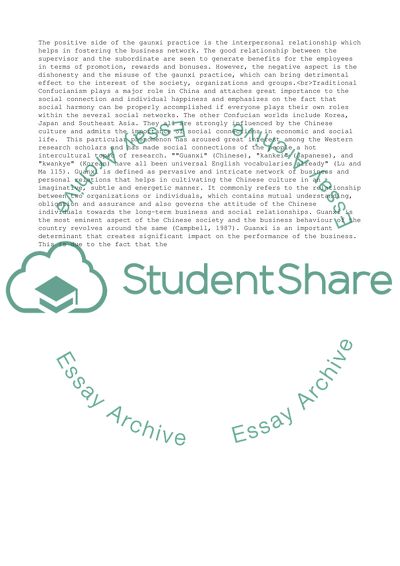Cite this document
(Chinese guanxi-based networking has been described as a cultural mode Essay, n.d.)
Chinese guanxi-based networking has been described as a cultural mode Essay. https://studentshare.org/management/1805761-chinese-guanxi-based-networking-has-been-described-as-a-cultural-mode-of-communications-or-the-logic-of-business-what-are-the-positive-and-negative-consequences-of-guanxi-for-chinese-managerial-practices
Chinese guanxi-based networking has been described as a cultural mode Essay. https://studentshare.org/management/1805761-chinese-guanxi-based-networking-has-been-described-as-a-cultural-mode-of-communications-or-the-logic-of-business-what-are-the-positive-and-negative-consequences-of-guanxi-for-chinese-managerial-practices
(Chinese Guanxi-Based Networking Has Been Described As a Cultural Mode Essay)
Chinese Guanxi-Based Networking Has Been Described As a Cultural Mode Essay. https://studentshare.org/management/1805761-chinese-guanxi-based-networking-has-been-described-as-a-cultural-mode-of-communications-or-the-logic-of-business-what-are-the-positive-and-negative-consequences-of-guanxi-for-chinese-managerial-practices.
Chinese Guanxi-Based Networking Has Been Described As a Cultural Mode Essay. https://studentshare.org/management/1805761-chinese-guanxi-based-networking-has-been-described-as-a-cultural-mode-of-communications-or-the-logic-of-business-what-are-the-positive-and-negative-consequences-of-guanxi-for-chinese-managerial-practices.
“Chinese Guanxi-Based Networking Has Been Described As a Cultural Mode Essay”. https://studentshare.org/management/1805761-chinese-guanxi-based-networking-has-been-described-as-a-cultural-mode-of-communications-or-the-logic-of-business-what-are-the-positive-and-negative-consequences-of-guanxi-for-chinese-managerial-practices.


